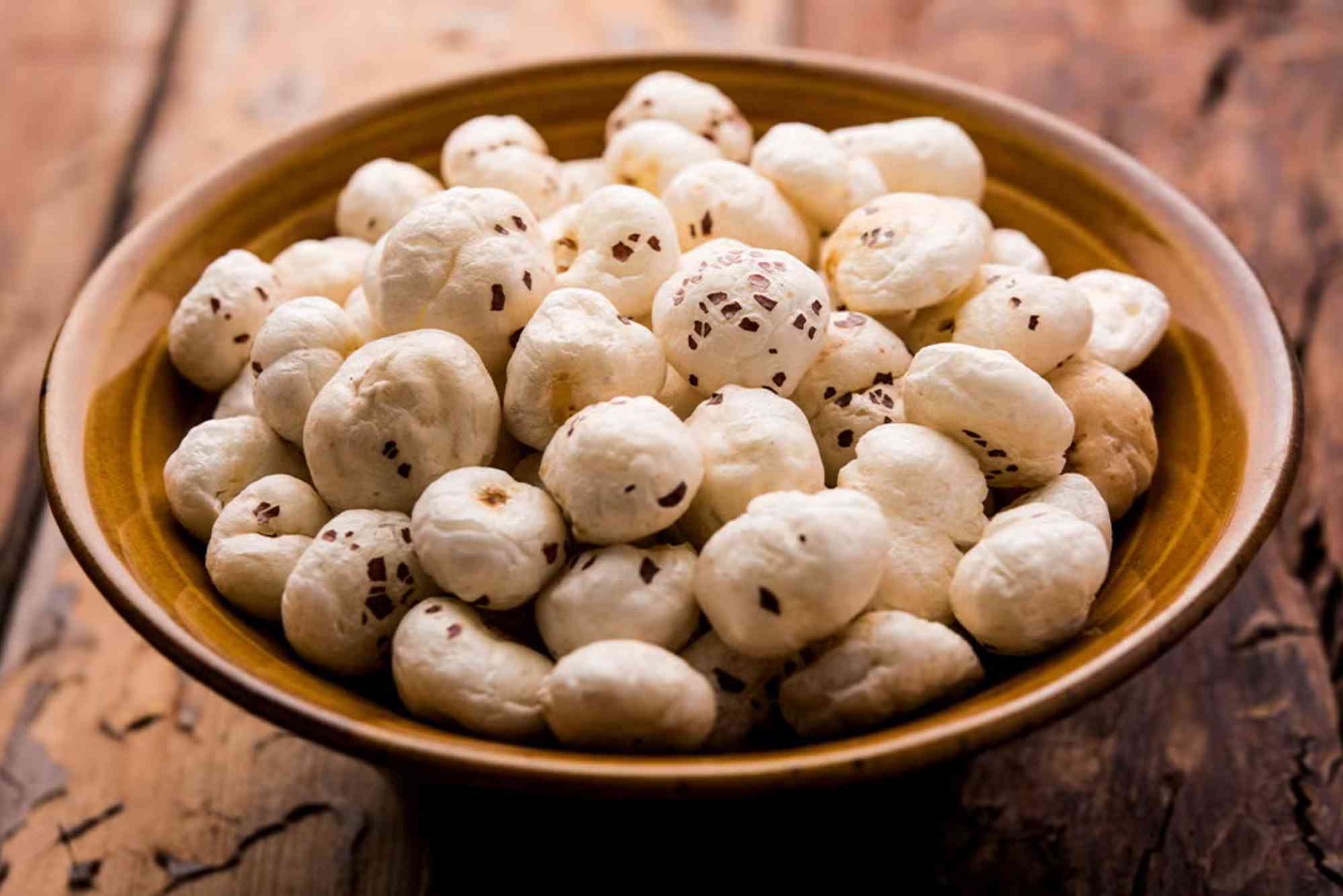Introduction
When it comes to choosing the right first foods for babies, parents often look for something nutritious, natural, and easy to digest. One trending option gaining attention is makhana—also known as fox nuts or lotus seeds. Rich in nutrients and rooted in traditional medicine, makhana has sparked conversations around whether it’s a superfood or just another health fad. In this article, we’ll explore makhana health benefits for babies, backed by science and expert opinions, to help you make an informed decision.
What Is Makhana?
Makhana comes from the Euryale ferox plant, which grows in water and is commonly found in parts of Asia, especially India and China. The seeds are collected, dried, and then popped like popcorn. They’ve been used in Ayurveda for centuries to support digestion, kidney function, and energy. For adults, makhana is a go-to snack due to its low-calorie, high-protein profile. But does this translate well to infants?
When Can You Introduce Makhana to Babies?
The best time to introduce makhana is after your baby turns 8 months old, once they’ve adjusted to basic solids. At this age, their digestive system is more mature, making it easier to process mildly roasted or powdered makhana. Always consult your pediatrician before introducing any new food, especially if your baby has a sensitive stomach or a history of allergies.
Nutritional Value of Makhana
Makhana is rich in essential nutrients. A 100g serving contains about 9.7g of protein, 60g of carbohydrates, and less than 1g of fat. It’s also a good source of calcium, magnesium, potassium, and phosphorus. These nutrients are crucial for your baby’s bone development, muscle growth, and cognitive function. Its low sodium and sugar content make it an ideal candidate for a baby-safe diet.
Makhana Health Benefits for Babies
Introducing makhana to your baby’s diet can offer a variety of health advantages. Below are the key makhana health benefits for babies that make it stand out as a superfood.
Supports Bone Development
Makhana is naturally high in calcium and phosphorus, both essential for bone formation and strength. Babies grow rapidly during the first few years, and their bones require a steady supply of these minerals. Including makhana can help support strong bones and teeth without relying solely on dairy products.
Aids Digestion
Babies often suffer from digestive issues when new foods are introduced. Makhana contains natural fiber that helps in smooth bowel movement and prevents constipation. Its light and non-greasy nature makes it easy to digest, reducing the chances of bloating or discomfort.
Boosts Immunity
The antioxidants found in makhana, such as flavonoids and polyphenols, can help strengthen a baby’s immune system. While immunity is still developing in infants, foods rich in antioxidants help the body fight off infections and inflammation naturally.
Promotes Brain Health
Makhana is a good source of magnesium, which plays a vital role in brain development and function. The presence of thiamine (vitamin B1) in makhana also supports nerve function and helps improve cognitive abilities during early growth stages.
Improves Energy Levels
Thanks to its complex carbohydrates and protein content, makhana provides a sustained energy release. Babies are constantly growing and require energy not just for movement but also for cellular repair and brain development. Makhana gives them a slow-burning energy source that doesn’t cause sugar spikes.
Allergy-Friendly and Gluten-Free
One of the biggest worries for parents is food allergies. Makhana is naturally gluten-free and rarely causes allergic reactions, making it a safe bet for many babies. However, always introduce it in small amounts and observe for any unusual reactions.
Promotes Healthy Weight Gain
For babies who are underweight or have trouble gaining healthy weight, makhana can be a nutritious addition to their meals. Its balanced mix of protein and carbohydrates supports healthy growth without the risk of excess fat.
Encourages Better Sleep
Tryptophan, an amino acid found in makhana, is linked to serotonin production, which helps regulate mood and sleep. Including makhana in evening meals may help soothe your baby and promote better sleep patterns.
How to Prepare Makhana for Babies
Babies can’t chew hard snacks, so preparation is key. Start by dry roasting makhana in a pan until crisp. Then grind it into a fine powder. This can be mixed with pureed fruits, rice cereal, or porridge. You can also cook makhana in milk (if your baby has started dairy) to make a soft kheer-like dish. For teething babies, slightly softened makhana snacks can also be given under supervision.
Avoid adding salt, sugar, or spices when preparing makhana for babies. Simplicity is safest when it comes to infant food. Keep portions small—1 to 2 teaspoons initially—and gradually increase based on tolerance and interest.
Potential Risks and Precautions
Despite the many makhana health benefits for babies, a few precautions are necessary. Since makhana expands in the stomach, too much can cause a feeling of fullness or minor discomfort. Overfeeding can also lead to constipation in some babies due to its dry texture. Always offer water or breast milk along with makhana-based foods.
Watch for allergic reactions like rashes, vomiting, or breathing difficulty—although rare, no food is entirely without risk. Additionally, avoid giving whole makhana pieces to infants under 1 year old to prevent choking hazards. Always monitor your baby during feeding.
Comparing Makhana to Other Baby Foods
How does makhana stack up against other popular baby foods like rice cereal, oats, or mashed fruits? While fruits are rich in vitamins and cereals in carbs, makhana offers a more protein-rich alternative with added antioxidants. It’s an excellent way to add variety to your baby’s diet without relying heavily on processed options. When combined with fruits or milk, makhana enhances overall nutrition.
What Pediatricians Say
Most pediatricians support the introduction of makhana after 8 months, especially in powdered or mashed form. According to Dr. Anjali Shah, a child nutritionist, makhana is a “low-allergen, high-benefit” food suitable for babies transitioning to solids. However, experts emphasize that makhana should not be the sole source of nutrition but part of a balanced diet.
Is Makhana a Superfood or Just Hype?
Given its impressive nutritional profile, ease of preparation, and wide-ranging benefits, makhana rightly earns its place as a superfood for babies. While it’s not a miracle food, it is certainly a smart, safe, and health-boosting addition to your baby’s diet. The key lies in moderation, variety, and preparation. Makhana can complement fruits, cereals, and vegetables, offering unique advantages like bone strengthening, brain support, and immune boosting.
As always, consult your pediatrician before making any significant dietary changes for your baby. Once cleared, feel confident about adding makhana to your baby’s menu. It’s not just a food—it’s nourishment rooted in tradition and supported by modern health science.
FAQs
Is makhana good for 6-month-old baby?
Most pediatricians recommend waiting until the baby is 8 months old before introducing makhana. A 6-month-old’s digestive system may not yet be ready for solid or semi-solid foods like makhana, especially if it’s not finely powdered. It’s safer to start with single-ingredient purees and consult your doctor before adding makhana.
How to give makhana to babies?
You can roast and grind makhana into a fine powder and mix it with breast milk, formula, or porridge. It can also be cooked in milk as a pudding for babies over 8 months. Avoid giving whole makhana to prevent choking and do not add any sugar or salt.
Can makhana cause constipation in babies?
While makhana contains fiber, it can be dry in texture. If not paired with enough fluids or given in large amounts, it may cause mild constipation in some babies. Ensure your baby stays hydrated and serve makhana in small portions.
How often can babies eat makhana?
Babies can eat makhana 2–3 times a week in small quantities. It’s best to rotate it with other nutritious foods to provide a balanced diet and avoid over-dependence on a single ingredient.
Are there any side effects of makhana for babies?
Makhana is generally safe and rarely causes allergies. However, potential side effects may include gas, bloating, or constipation if overfed. Always introduce it gradually and watch for any unusual symptoms like rashes or discomfort.





